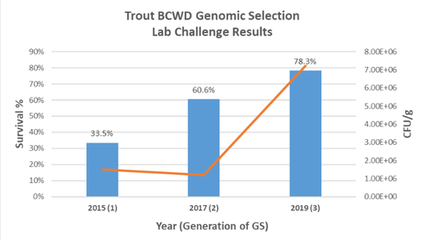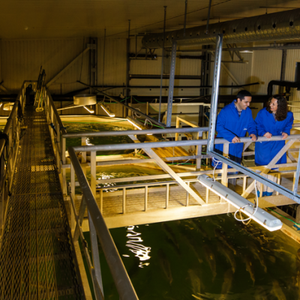Joint research of the United States Department of Agriculture (USDA) and Troutlodge has shown that genomic selection can double the prediction accuracy for bacterial cold water disease (BCWD).
Infectious diseases remain the single largest cause of production-related mortality in the rainbow trout industry, accounting for 81% of the total losses in 2011. Flavobacterium psychrophilum, the bacteria that causes BCWD, causes substantial losses in the industry.
Flavobacterium psychrophilum is endemic worldwide and impacts both traditional and aquaculture related salmonid production. The pathogen causes outbreaks of both BCWD and rainbow trout fry syndrome, of which outbreaks can cause mortality of up to 85%. A significant amount of research has been done in attempts to develop protection from F. psychrophilum, however, no effective vaccine has yet been produced, and the molecular pathogenesis involved with infections is not well understood.
Seven years ago, Troutlodge and the USDA formed a long-term collaboration to help combat this worldwide problem. The approach included the use of genomic selection, the concept of using genome-wide dense genetic maps to predict the genetic merit of individual animals and enhance selective breeding efficiency. Troutlodge and the USDA worked together to increase selection accuracy for BCWD and apply the technology to commercially available broodstock.
In 2017, the team saw an improvement of 80% in survival. The application of genomic selection for BCWD resistance to three generations of Troutlodge broodstock resulted in a challenge survival increasing from 33.5% in 2015 to 78.3% in 2019, which means a staggering improvement of 134%.
Since that time, Troutlodge eggs with enhanced survival to BCWD are sold successfully. The eggs commercially available today with enhanced resistance to BCWD demonstrate even much better resistance.














